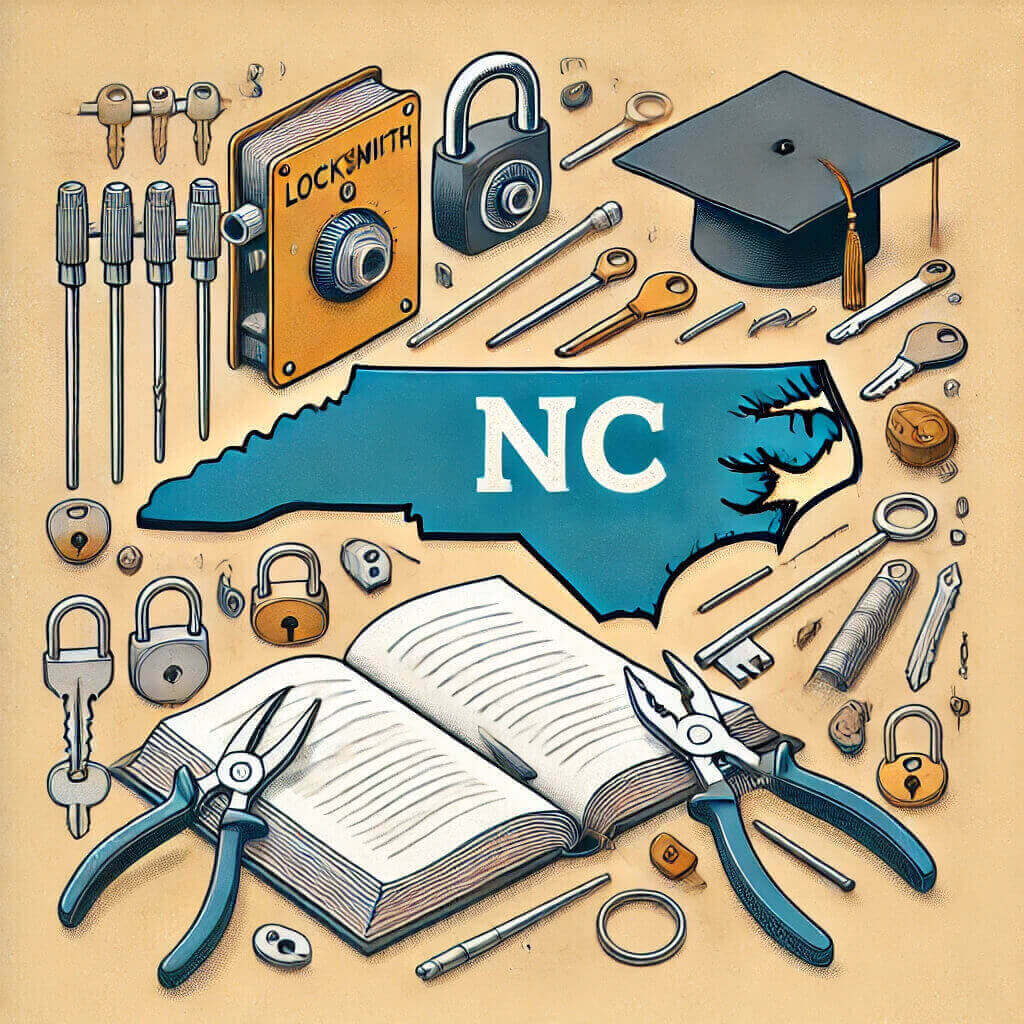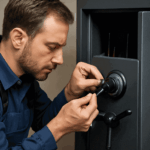Are you interested in learning how to become a locksmith in NC? The locksmith profession offers a rewarding career path with strong growth potential in North Carolina. According to the Bureau of Labor Statistics, the demand for skilled locksmiths in NC is projected to grow by 6% through 2030, faster than the national average. Whether you’re looking to join an established company or start your own business, this comprehensive guide will walk you through every step of becoming a licensed locksmith in North Carolina.
Steps To Become A Locksmith In North Carolina
| Steps | Description |
| Understand the Profession | Gain insight into locksmith roles, responsibilities, and various specializations within the field. |
| Meet NC Basic Requirements | Ensure you meet the essential criteria, including age, education, background checks, and having a valid driver’s license. |
| Complete Education and Training | Enroll in vocational training programs, community college courses, or online locksmith training to build foundational skills. |
| Participate in Apprenticeships | Engage in apprenticeship programs that combine on-the-job training with technical instruction under experienced mentors. |
| Obtain Licensing and Certification | Apply for a state locksmith license by completing approved training, passing examinations, undergoing background checks, and paying necessary fees. |
| Pursue Professional Certifications | Enhance your credentials by obtaining certifications such as Certified Registered Locksmith (CRL), Certified Professional Locksmith (CPL), and Certified Master Locksmith (CML). |
| Launch Your Career or Business | Choose between seeking employment with established companies or starting your own locksmith business, including business registration, obtaining permits, and marketing your services. |

STEP 1: Understand the Locksmith Profession
Professional locksmiths in North Carolina are essential security experts who do much more than just help people who are locked out of their homes or cars. Modern locksmiths work with sophisticated electronic access systems, high-security locks, and advanced automotive security technologies. This evolution in the field has expanded the scope of locksmith services, making the profession both challenging and highly specialized.
According to the North Carolina Locksmith Association, the average annual salary for locksmiths in the state ranges from $35,000 to $65,000, with experienced professionals earning even more. This salary range reflects the diversity of services offered and the level of expertise required in different areas of locksmithing.
Key Responsibilities:
- Installing and fixing various locks and security systems
- Providing emergency lockout services
- Programming electronic access systems
- Creating and duplicating keys
- Consulting on security solutions
STEP 2: Meeting NC Basic Requirements
To begin your journey as a locksmith in North Carolina, you must meet these essential requirements:
Essential Requirements:
- Be at Least 18 Years Old: This is the minimum age requirement to pursue a locksmith career in North Carolina, ensuring that applicants are legally adults capable of handling the responsibilities of the job.
- Hold a High School Diploma or GED: A foundational education is necessary. Courses in mathematics, mechanical drawing, and computer skills can be particularly beneficial.
- Pass a Comprehensive Background Check: Given the sensitive nature of the work, a thorough background check is mandatory to ensure the integrity and trustworthiness of the locksmith.
- Have a Valid Driver’s License: Mobility is crucial for locksmiths who often need to travel to clients’ locations. A valid driver’s license is required to facilitate this mobility.
- Maintain a Clean Criminal Record: A spotless criminal record is essential as locksmiths handle access to secure locations and sensitive information.
Also Read: How Do Locksmiths Open Doors
STEP 3: Education and Training Programs
North Carolina offers several pathways to obtain the necessary education and training for aspiring locksmiths. These programs equip you with the technical skills and knowledge required to excel in the field.
Vocational Training:
- Durham Technical Community College’s Locksmith Certificate Program (16 weeks): This intensive program provides hands-on training in key cutting, lock installation, and advanced security systems.
- Wake Technical Community College’s Security Systems Technology Program: Focuses on comprehensive security systems, including electronic access controls and high-security lock mechanisms.
- Online Courses from Recognized Institutions like Penn Foster: Flexible online programs offer foundational knowledge and skills, allowing you to learn at your own pace.
Apprenticeship Opportunities:
The North Carolina Department of Labor oversees apprenticeship programs that typically last between 12 to 18 months. These programs combine practical on-the-job training with technical instruction, ensuring a well-rounded education.
- On-the-Job Training: Completing 2,000-4,000 hours of hands-on work under the supervision of experienced locksmiths.
- Technical Instruction: Attending 144 hours of classroom-based training to learn the theoretical aspects of locksmithing.
- Hands-On Experience with Experienced Mentors: Gaining valuable insights and advanced techniques from seasoned professionals in the field.
STEP 4: Licensing and Certification
In North Carolina, locksmiths must obtain proper licensing through the NC Locksmith Licensing Board. This process ensures that all practicing locksmiths meet the state’s standards for competency and reliability.
State Licensing Requirements:
- Completing an Approved Training Program: Successfully finish a state-approved locksmith training program, which covers essential skills and knowledge.
- Passing the State Locksmith Examination: Demonstrate your proficiency and understanding of locksmithing principles by passing the state-administered exam.
- Submitting Fingerprints for Background Check: Provide biometric data to facilitate a thorough background investigation.
- Paying the Licensing Fee: An initial fee of $300 is required, with a subsequent renewal fee of $150 to maintain your license.
- Maintaining Continuing Education Credits: Engage in ongoing education to stay updated with industry advancements and retain your licensing status.
Industry Certifications:
While not always mandatory, obtaining industry-recognized certifications can significantly enhance your credibility and job prospects.
- Certified Registered Locksmith (CRL): Demonstrates a high level of expertise and commitment to the profession.
- Certified Professional Locksmith (CPL): Validates advanced skills and knowledge in locksmithing.
- Certified Master Locksmith (CML): This is the highest level of certification that proves proficiency in all aspects of locksmith services.
Organizations like the Associated Locksmiths of America (ALOA) offer these certifications, providing locksmiths with opportunities to distinguish themselves in a competitive market.
Professional Certifications
Consider pursuing these industry-recognized certifications to further validate your expertise and enhance your professional standing:
- Certified Registered Locksmith (CRL): Focuses on fundamental locksmith skills and knowledge.
- Certified Professional Locksmith (CPL): Covers more advanced techniques and specialized areas within locksmithing.
- Certified Master Locksmith (CML): Represents comprehensive mastery over all locksmithing aspects, including high-security systems and advanced electronic access controls.
Obtaining these certifications not only boosts your resume but also provides clients with confidence in your abilities and professionalism.
Also Read: How to Become a Locksmith in Arizona?
STEP 5: Launching Your Career
Once you have met the basic requirements, completed your education and training, and obtained the necessary licenses and certifications, you are ready to launch your locksmith career in North Carolina.
Employment Options:
Many successful locksmiths in NC start their careers with established companies, which offer structured environments and opportunities for growth.
- Local Locksmith Businesses: Join established local firms to gain experience and build a client base.
- Security Companies: Work with companies that provide comprehensive security solutions to various clients.
- Hardware Stores: Some hardware retailers employ locksmiths to assist customers with lock and key needs.
- Government Facilities: Secure positions within government agencies that require specialized security services.
- Educational Institutions: Provide security services to schools and universities, ensuring the safety of students and staff.
Starting Your Own Business:
For those aspiring to be entrepreneurs, starting your own locksmith business in North Carolina can be highly rewarding. Here are the steps to establish your business:
- Register Your Business with the State: Choose a business structure (e.g., sole proprietorship, LLC) and register your business name with the North Carolina Secretary of State.
- Obtain Necessary Permits and Insurance:
- General Liability Insurance: Protects your business from claims related to property damage or bodily injury.
- Professional Liability Insurance: Covers errors and omissions in your professional services.
- Vehicle Insurance: Essential if you use a vehicle for business purposes, ensuring coverage for accidents and liabilities.
- Invest in Essential Tools and Equipment: Purchase high-quality locksmith tools, key cutting machines, and specialized equipment necessary for providing a wide range of services.
- Develop a Marketing Strategy:
- Create a Professional Website: Showcase your services, expertise, and contact information to attract clients online.
- Establish Local Business Listings: Register your business on platforms like Google My Business to enhance local visibility.
- Join Professional Networks: Engage with local business associations and online communities to expand your reach and reputation.
Launching your own locksmith business requires careful planning and investment, but it offers the flexibility and potential for significant financial rewards.
Summary
Learning how to become a locksmith in NC opens doors to a stable and rewarding career in the security industry. With proper training, certification, and dedication, you can build a successful career as a trusted security professional in North Carolina. The field offers numerous growth opportunities, whether you choose to specialize in a particular area or start your own business. Take the first step today by enrolling in an approved training program and beginning your journey toward becoming a licensed North Carolina locksmith.
Frequently Asked Questions
Do you need a license to be a locksmith in NC?
No, North Carolina does not require a specific state license for locksmiths, but you must obtain a general business license and comply with local regulations.
How much do locksmiths make in NC?
Locksmiths in North Carolina typically earn between $35,000 and $55,000 annually, depending on experience, specialization, and location.
What is the future of locksmithing?
The future of locksmithing is strong, driven by advancements in smart lock technology, increased security needs, and the integration of electronic and biometric systems.
What are the benefits of being a locksmith?
Benefits include job stability, opportunities for entrepreneurship, diverse work environments, and the satisfaction of providing essential security services to the community.






